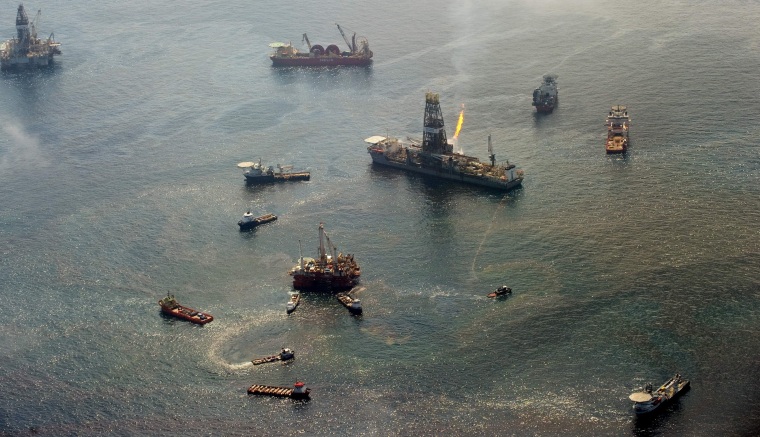Undersea sensors were being deployed to a ruptured well in the Gulf of Mexico on Sunday in an effort to better track the amount of oil gushing into the sea, the Coast Guard said, as pressure mounted on BP fromthe Obama administration and Gulf states to create special accounts that would set aside billions of dollars to pay for spill-related claims.
New estimates say the blown-out well could have been spewing as much as 2 million gallons of crude a day before a cut-and-cap maneuver earlier this month started capturing some of the flow.
This means more than 100 million gallons may have leaked into the Gulf since the start of the disaster in April — more than nine times the size of the 1989 Exxon Valdez disaster off Alaska, previously the worst oil spill in U.S. history.
Scientists have struggled to pin down just how much oil is spilling into the Gulf, and the government has stressed that the larger estimates were still preliminary and considered a worse-case scenario. The lead scientist in the effort said last week that the most credible range at the moment is between 840,000 gallons and 1.68 million gallons daily.
The Obama administration's point man on the oil spill, Adm. Thad Allen, said the sensors were going to be deployed Sunday and will start taking pressure readings to validate the estimates, which have been made by using such things as spillcam video and sonar readings.
"I've told everybody from the start these are only estimates. We will only know what is flowing out of that well when we have it completely capped, control the flow, can actually measure," Allen told CBS television's "Face the Nation" on Sunday.
Days after the spill began, government officials told the public that the ruptured well a mile below the Gulf was leaking 42,000 gallons a day. Then, officials said it was actually five times bigger. That estimate didn't last long either.
It's also not known just how much oil started to leak after the riser pipe was cut on June 3, a step that BP and government officials said could increase the flow by 20 percent. The pipe cut was necessary to install a cap over the well.
BP said Sunday that the containment cap captured about 631,680 gallons of oil Saturday, preventing that discharge from flowing into the ocean. The system has collected more than 5 million gallons of oil to date.
BP is hard at work trying to find new ways to capture more oil. To boost its capacity, BP also plans to trap oil using lines that will suck oil and gas from the well to a drilling rig where it will be burned. This system could be working by early next week, BP said.
Escrow account
Meanwhile, the White House and at least two Gulf states demanded that BP create special accounts that would set aside money to pay for the mounting claims related the spill.
President Barack Obama wants an independent, third party to administer the escrow account and compensate those with "legitimate" claims for damages, Obama's top political adviser said Sunday. The amount of money set aside will be discussed during talks this week between the White House and BP, but Obama aide David Axelrod said it should be "substantial."
"We are aware of the request," said BP spokeswoman Sheila Williams in London. She declined to comment further.
Gulf states also were putting the squeeze on BP. The attorney general in Florida and the state treasurer in Louisiana want BP to put a total of $7.5 billion in escrow accounts to compensate the states and their residents for damages now and in the future amid talk of the possibility that BP may eventually file for bankruptcy.
"At the end of the day, my concern is Louisiana," state treasurer, John Kennedy, told The Associated Press on Saturday. "BP ultimately will do what BP thinks is best for BP."
Tensions between BP and the federal government have ramped up as the public outrage over the spill has grown. Obama has come under increasing criticism for his response to the disaster, with even some of his strongest admirers feeling his response at times has been hesitant and aloof.
The president will meet BP executives, including the company's chairman, on Wednesday, a day after he returns from the Gulf. The president also plans an Oval Office address to the American public on Tuesday night.
Along the Gulf coast, cleanup crews worked throughout the night to clear the oil from the white sand in Orange Beach, Alabama. On Sunday, plastic bags filled with oil and sand sat along the beach, where the remaining sand was stained dark brown.
Across the state line in Florida, beaches were free of oil and tar in Pensacola on Sunday.
"I saw the news that it was kept under control and it really hasn't had a major impact on the beach here yet," said Kevin Lewis, a Pinellas County deputy sheriff from Clearwater, who was at Pensacola Beach with his daughter.
